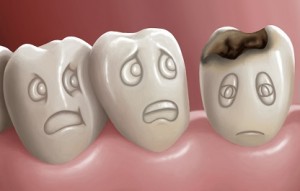
02 Dec Are Cavities Contagious? Research Says Yes
 Do you have a child who has developed cavities at a very young age, even though you know your child has diligent dental care? Or maybe you keep on getting cavities, but yet you take excellent care of your teeth; new research shows that cavities are in fact contagious, and it may surprise you to learn that the bacteria (mutans streptococcus) that causes tooth decay can be passed from person to person. While some tend to have more cavity causing bacteria in their mouth, mutans streptococcus is a bacteria that feeds on the sugar in your mouth, resulting in an acid byproduct that eats away at the enamel on your teeth; if teeth are not cleaned properly the mix of food, acid, germs, and saliva create a plaque that contains more acid, eroding teeth as it continues to eat away at your tooth enamel. Wondering how you can prevent the transmission of this harmful bacterium? Here are some ways to stop the flow of bacteria, in addition to keeping your mouth clean, happy and healthy:
Do you have a child who has developed cavities at a very young age, even though you know your child has diligent dental care? Or maybe you keep on getting cavities, but yet you take excellent care of your teeth; new research shows that cavities are in fact contagious, and it may surprise you to learn that the bacteria (mutans streptococcus) that causes tooth decay can be passed from person to person. While some tend to have more cavity causing bacteria in their mouth, mutans streptococcus is a bacteria that feeds on the sugar in your mouth, resulting in an acid byproduct that eats away at the enamel on your teeth; if teeth are not cleaned properly the mix of food, acid, germs, and saliva create a plaque that contains more acid, eroding teeth as it continues to eat away at your tooth enamel. Wondering how you can prevent the transmission of this harmful bacterium? Here are some ways to stop the flow of bacteria, in addition to keeping your mouth clean, happy and healthy:
- Don’t Share Toothbrushes – Many may view this as common sense, but everyone should have their own toothbrush and it should be changed out frequently. The ADA (American Dental Association) recommends you changing out your toothbrush every 3-4 months or sooner if you’ve been sick or the bristles on the brushes have become frayed.
- Avoid Sharing Utensils – Even though it can be common for family members to share utensils with one another, this habit should be avoided in order to stop the transference of bacteria from one mouth to another.
- Chew Gum – Make sure that the gum is sugar-free; a good sweetener that won’t rot out your teeth is Xylitol, pick a brand that has this sweetener listed in its ingredients and chew it three times a day for at least five minutes. Xylitol boosts saliva production, which helps the fight against bad bacteria.
- Drink Water – Besides keeping you hydrated, drinking water is beneficial to your teeth because like gum it washes away plaque and bacteria from your mouth.
- Keep A Clean Mouth – Make sure to set a good example for your children by brushing and flossing regularly. Also make sure you are using a good mouthwash, as this can help fight off the bacteria and prevents plaque from forming, preventing decay from developing into cavities.
- Clean Your Child’s Pacifier in the Sink, Not in Your Mouth – Sounds yucky, but a lot of parents do this when their child drops their pacifier, so in order to prevent the spread of bacteria make sure to always have a clean one handy; instead of letting it take a dip into your mouth, wash it off in the sink instead!
- Visit the Dentist – In order to prevent passing on cavities one must schedule regular dental check-ups with their dentist. Regular cleanings every six months can help prevent decay from turning into cavities, and also helps reduce the bacteria in your mouth.
- Limit Intake of Sugar and Soda – Have a limit on the amount of sugar you are eating, as well as the amount of soda that you are drinking. The sugar and the acidity can lead to dental health issues as they speed up the process of decay and the loss of enamel.


